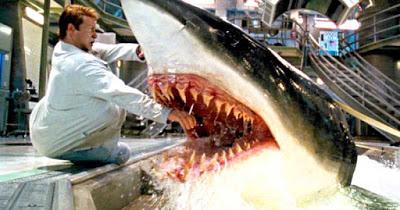Format: DVD from personal collection on basement television.

Ever since Jaws, directors and producers have tried to recapture that magic. Sharks are a natural choice for this because, as Hooper tells us in the 1975 classic, sharks are a miracle of evolution—all they do is swim, eat, and make baby sharks. Over and over, filmmakers have failed to make sharks as interesting as Spielberg did, but Renny Harlin tried in 1999 with Deep Blue Sea. This film is kind of a genre mash-up. It’s clearly a man vs. nature film with nature in the form of a trio of sharks, but it’s also a science gone wild film and has a lot of similarities with a haunted house movie as well.
Research scientists on an offshore floating laboratory are doing work with sharks to find a cure for (among other things) Alzheimer’s. Why sharks? Because, we are told, sharks are primordial creatures that don’t get cancer or terrible illnesses. Why Alzheimer’s? Because one of our lead scientists has a personal family grudge against the ailment. The problem is that one of the sharks got loose and had to be corralled, and now the really rich dude funding them (Samuel L. Jackson) is ready to pull the plug. Our scientist-in-charge, Dr. Susan McAlester (Saffron Burrows) makes the case for needing 48 hours to get results. Our rich benefactor, in all of his Samuel L. Jackson glory, goes back to the lab with her to see what is going on.
What is happening, of course, is that the science team has gone off the reservation. Knowing that they’ll get their funding pulled without results, the team has broken a number of ethical rules in enhancing the brains of their test sharks to get more of the chemical they need for their trials. While this has gotten the results they want, it’s also made the sharks smarter. They’re now hunting in packs, and it’s clear that they are also becoming more vicious.
And, then there’s a series of errors. In what appears to be a freak accident, team lead Jim Whitlock (Stellan Skarsgard) has his arm bitten off by one of the sharks. As he is being Medivacced out of the facility, a mechanical problem causes him to fall into the shark tank, and the sharks, being smarter than they were in the past, use his body to smash into the glass on one of the lower levels of the facility. With a massive storm brewing above, the team and their benefactor are trapped in a flooding aquatic facility with three smart and hungry sharks on the prowl. It’s honestly a pretty good set-up for a horror film.
The cast is a pretty good one for such fare. In addition to those already mentioned, we have Thomas Jane as essentially the main character, an ex-con hired on as a shark wrangler. Also onboard are Michael Rappaport as the team’s engineer, Jacqueline McKenzie as the marine biologist, and LL Cool J as the team’s chef. He’s also in parts going to be the comic relief of the film, which seems like a thankless job, but he handles it well, and also fights back against the “Black folks don’t live through horror movies” trope. He even mentions it at one point.
I don’t want to go too far into the plot details here, because there is a specific moment in Deep Blue Sea that makes it worth watching. If you’ve seen the movie (and likely even if you haven’t), you know the moment I’m talking about. It’s one of the better surprise moments from a genre movie in the last couple of decades, and it still really works well. There’s also some real playing with expectations toward the end of the film, another thing for which Deep Blue Sea deserves some credit.
There are some issues here, though. First, and primarily, I genuinely object to a film that goes out of its way to make science the villain. We live in a world where millions of people doubt vaccine efficacy, think the world is flat, and believe that the planet is about 6,000 years old. Can we please stop making science evil in movies? Can we start making science the heroes and start getting people to trust the idea of knowledge and truth again?
A secondary problem, but still a serious one, is just how bad the CGI is in this film. It’s a reminder of what is possible with good effects and why practical effects are so much better than computer effects. Things are very clearly animated, and frequently animated poorly. This movie came out in the same year as The Matrix and looks at least 10 years older. In that respect, it hasn’t held up.
But it does have its moments. It’s not a great film, but it’s not a bad one, and if you like big creature horror movies, you could do a lot worse than this one.
Why to watch Deep Blue Sea: It has some truly classic moments.
Why not to watch: Terrible CGI, and naturally science is the villain.
